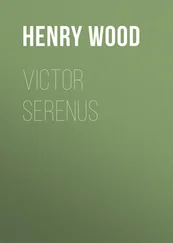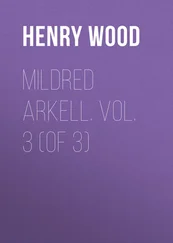Henry Wood - Johnny Ludlow, Sixth Series
Здесь есть возможность читать онлайн «Henry Wood - Johnny Ludlow, Sixth Series» — ознакомительный отрывок электронной книги совершенно бесплатно, а после прочтения отрывка купить полную версию. В некоторых случаях можно слушать аудио, скачать через торрент в формате fb2 и присутствует краткое содержание. Жанр: foreign_prose, literature_19, foreign_antique, на английском языке. Описание произведения, (предисловие) а так же отзывы посетителей доступны на портале библиотеки ЛибКат.
- Название:Johnny Ludlow, Sixth Series
- Автор:
- Жанр:
- Год:неизвестен
- ISBN:нет данных
- Рейтинг книги:5 / 5. Голосов: 1
-
Избранное:Добавить в избранное
- Отзывы:
-
Ваша оценка:
- 100
- 1
- 2
- 3
- 4
- 5
Johnny Ludlow, Sixth Series: краткое содержание, описание и аннотация
Предлагаем к чтению аннотацию, описание, краткое содержание или предисловие (зависит от того, что написал сам автор книги «Johnny Ludlow, Sixth Series»). Если вы не нашли необходимую информацию о книге — напишите в комментариях, мы постараемся отыскать её.
Johnny Ludlow, Sixth Series — читать онлайн ознакомительный отрывок
Ниже представлен текст книги, разбитый по страницам. Система сохранения места последней прочитанной страницы, позволяет с удобством читать онлайн бесплатно книгу «Johnny Ludlow, Sixth Series», без необходимости каждый раз заново искать на чём Вы остановились. Поставьте закладку, и сможете в любой момент перейти на страницу, на которой закончили чтение.
Интервал:
Закладка:
“Who on earth is Miss Barbary?” questioned Tod. “Any relation to the man at Caramel Cottage?”
“His daughter,” said Mrs. Todhetley. “She comes to teach Lena French.”
“Hope she’s less of a shady character than her father!” was Tod’s free comment.
A year or two before this, a stranger had made his appearance at Church Dykely, and put up at the Silver Bear. He was a gentlemanly-looking man of perhaps forty years, tall, slender, agile, with thin, distinguished features, an olive skin, black hair, and eyes of a peculiar shade of deep steel-blue. People went into raptures over his face, and called it beautiful. And so it was; but to my thinking it had a look in it that was the opposite of beautiful; any way, the opposite of good. They said it was my fancy at home: but Duffham owned to the same fancy. His name, as he wrote it down one day at the Silver Bear, was Pointz Barbary. After a week’s stay at the inn, he, finding, I suppose, that the neighbourhood suited him, looked out for a little place to settle down upon, and met with it in Caramel Cottage, a small dwelling near to us, on the property called Caramel’s Farm. The cottage was then to be let, and Mr. Barbary went into it.
Some items of his past history came out by degrees; it is hard to say how, for he told none himself. Now and then some former friend or other came to pay him a short visit; and it may be that these strangers talked about him.
Pointz Barbary, a gentleman by descent, and once of fairly good substance, had been a great traveller, had roved pretty nearly all over the world. The very few relatives he possessed lived in Canada—people of condition, it was said—and his own property (what was left of it) was also there. He had been married twice. First to a young lady in France; her friends (English) having settled there for economy’s sake. She died at the end of the year, leaving him a little girl, that the mother’s people at once took to. Next he married a Miss Reste, daughter of Colonel Reste, in her Majesty’s service. A few years later she also died—died of consumption—leaving him a widower and childless. It’s true he had his first wife’s daughter, but she lived in France with her mother’s sister, so he did not get much benefit from her.
Mr. Barbary was poor. No mistake about that. The interest of his first wife’s money brought him in fifty-two pounds yearly, and this he would enjoy till his death, when it went to his daughter. Miss Reste had brought him several thousand pounds; but he and she had lived away, and not a stiver remained of it. His own means had also been spent lavishly; and, so far as was known, he had but the two and fifty pounds a year to live upon at Caramel Cottage, with a chance remittance from Canada now and again.
He made no acquaintance at Church Dykely, and none was made with him. Civilly courteous in a rather grand and haughty way when he met people, so far as a few remarks went, touching the weather or the crops, and similar safe topics, he yet kept the world at a distance. As the time went on it was thought there might be a reason for this. Whispers began to circulate that Mr. Barbary’s doings were not orthodox. He was suspected of poaching, both in game and fish, and a strong feeling of shyness grew up against him.
Some few months prior to the present time—August—his daughter came to Caramel Cottage. Her aunt in France was dead, and she had no home henceforth but her father’s. That I and Tod had not seen or heard of her until now, was owing to the midsummer holidays having been spent at Crabb Cot. The vacation over, and Mrs. Todhetley back at Dyke Manor, she found herself called upon by Miss Barbary. Hearing that Mrs. Todhetley wished her little girl to begin French, she had come to offer herself as teacher. The upshot was that she was engaged, and came for a couple of hours every morning to drill French into Lena.
“What’s she like?” asked Tod of the mother, upon her explaining this. “Long and thin and dark, like Barbary, and disagreeable with a self-contained reticence?”
“She is not the least like him in any way,” was Mrs. Todhetley’s answer. “She is charmingly simple—good, I am sure, and one of the most open-natured girls I ever met. ‘I wish to do it for the sake of earning a little money,’ she said to me, when asking to come. ‘My dear father is not rich, and if I can help him in ever so small a way I shall be thankful.’ The tears almost came into her eyes as she spoke,” added Mrs. Todhetley; “she quite won my heart.”
“She seems to think great things of that respectable parent of hers!” commented Tod.
“Oh, yes. Whatever may be the truth as to his failings, she sees none in him. And, my dears, better that it should be so. She earns a little money of me, apart from teaching Lena,” added Mrs. Todhetley.
“What at?” asked Tod. “Teaching you ?”
The mother shook her head with a smile. “I found out, Joseph, that she is particularly skilful at mending old lace. I have some that needs repairing. She takes it home and does it at her leisure—and you cannot imagine how grateful she is.”
“How old is she?”
“Nineteen—close upon twenty, I think she said,” replied the mother. And there the conversation ended, for Mrs. Todhetley had to go to the kitchen to give the daily orders.
The morning wore on. We went to Church Dykely and were back again by twelve o’clock. Tod had got Don on the lawn, making him jump for biscuit, when the dog rushed off, barking, and we heard a scream. A young lady in a straw hat and a half-mourning cotton dress was running away from him, she and Lena having come out of the house together.
“Come here, Don,” said Tod in his voice of authority, which the good Newfoundland dog never disobeyed. “How dare you, sir? Johnny, lad, I suppose that’s Miss Barbary.”
I had forgotten all about her. A charming girl, as the mother had said, slight and graceful, with a face like a peach blossom, dimpled cheeks, soft light-brown hair and dark-blue eyes. Not the hard, steel-blue eyes that her father had: sweet eyes, these, with a gentle, loving look in them.
“You need not be afraid of the dog,” cried Tod, advancing to where she stood, behind the mulberry tree. “Miss Barbary, I believe?”—lifting his cap.
“Yes,” she said in a frank tone, turning her frank face to him; “I am Katrine Barbary. It is a very large dog—and he barks at me.”
Large he was, bigger than many a small donkey. A brave, faithful, good-tempered dog, he, and very handsome, his curly white coat marked out with black. Gentle to friends and respectable strangers, Don was at mortal enmity with tramps and beggars: we could not cure him of this, so he was chained up by day. At night he was unchained to roam the yard at will, but the gate was kept locked. Had he got out, he might have pinned the coat of any loose man he met, but I don’t believe he would have bitten him. A good fright Don would give, but not mortal injury. At least, we had never yet known him to do that.
Lena ran up in her short pink frock, her light curls flying. “Miss Barbary is always afraid when she hears Don bark,” she said to us. “She will not go near the yard; she thinks he’ll bite her.”
“I will teach you how to make friends with him,” said Tod: “though he would never hurt you, Miss Barbary. Come here and pat his head whilst I hold him; call him by his name gently. Once he knows you, he would protect you from harm with his life.”
She complied with ready obedience, though the roses left her cheeks. “There,” said Tod, loosing the dog, and letting her pat him at leisure, “see how gentle he is; how affectionately he looks up at you!”
“Please not to think me very silly!” she pleaded earnestly, as though beseeching pardon for a sin. “I have never been used to dogs. We do not keep dogs in France. At least very few people do. Oh dear!”
Читать дальшеИнтервал:
Закладка:
Похожие книги на «Johnny Ludlow, Sixth Series»
Представляем Вашему вниманию похожие книги на «Johnny Ludlow, Sixth Series» списком для выбора. Мы отобрали схожую по названию и смыслу литературу в надежде предоставить читателям больше вариантов отыскать новые, интересные, ещё непрочитанные произведения.
Обсуждение, отзывы о книге «Johnny Ludlow, Sixth Series» и просто собственные мнения читателей. Оставьте ваши комментарии, напишите, что Вы думаете о произведении, его смысле или главных героях. Укажите что конкретно понравилось, а что нет, и почему Вы так считаете.












